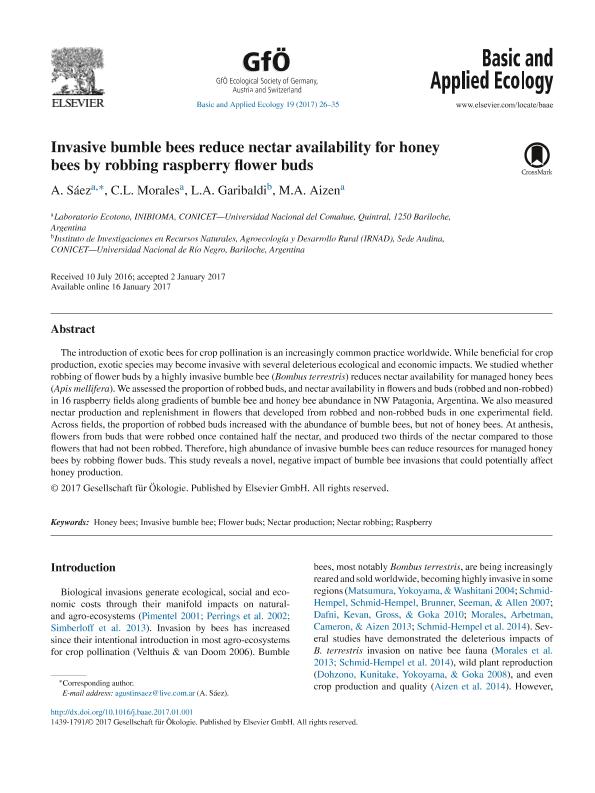Mostrar el registro sencillo del ítem
dc.contributor.author
Sáez, Agustín

dc.contributor.author
Morales, Carolina Laura

dc.contributor.author
Garibaldi, Lucas Alejandro

dc.contributor.author
Aizen, Marcelo Adrian

dc.date.available
2018-11-16T19:52:21Z
dc.date.issued
2017-03
dc.identifier.citation
Sáez, Agustín; Morales, Carolina Laura; Garibaldi, Lucas Alejandro; Aizen, Marcelo Adrian; Invasive bumble bees reduce nectar availability for honey bees by robbing raspberry flower buds; Elsevier Gmbh, Urban & Fischer Verlag; Basic and Applied Ecology; 19; 3-2017; 26-35
dc.identifier.issn
1439-1791
dc.identifier.uri
http://hdl.handle.net/11336/64653
dc.description.abstract
The introduction of exotic bees for crop pollination is an increasingly common practice worldwide. While beneficial for crop production, exotic species may become invasive with several deleterious ecological and economic impacts. We studied whether robbing of flower buds by a highly invasive bumble bee (Bombus terrestris) reduces nectar availability for managed honey bees (Apis mellifera). We assessed the proportion of robbed buds, and nectar availability in flowers and buds (robbed and non-robbed) in 16 raspberry fields along gradients of bumble bee and honey bee abundance in NW Patagonia, Argentina. We also measured nectar production and replenishment in flowers that developed from robbed and non-robbed buds in one experimental field. Across fields, the proportion of robbed buds increased with the abundance of bumble bees, but not of honey bees. At anthesis, flowers from buds that were robbed once contained half the nectar, and produced two thirds of the nectar compared to those flowers that had not been robbed. Therefore, high abundance of invasive bumble bees can reduce resources for managed honey bees by robbing flower buds. This study reveals a novel, negative impact of bumble bee invasions that could potentially affect honey production.
dc.format
application/pdf
dc.language.iso
eng
dc.publisher
Elsevier Gmbh, Urban & Fischer Verlag

dc.rights
info:eu-repo/semantics/openAccess
dc.rights.uri
https://creativecommons.org/licenses/by-nc-nd/2.5/ar/
dc.subject
Flower Buds
dc.subject
Honey Bees
dc.subject
Invasive Bumble Bee
dc.subject
Nectar Production
dc.subject
Nectar Robbing
dc.subject
Raspberry
dc.subject.classification
Agricultura

dc.subject.classification
Agricultura, Silvicultura y Pesca

dc.subject.classification
CIENCIAS AGRÍCOLAS

dc.subject.classification
Otras Ciencias Biológicas

dc.subject.classification
Ciencias Biológicas

dc.subject.classification
CIENCIAS NATURALES Y EXACTAS

dc.subject.classification
Otras Producción Animal y Lechería

dc.subject.classification
Producción Animal y Lechería

dc.subject.classification
CIENCIAS AGRÍCOLAS

dc.title
Invasive bumble bees reduce nectar availability for honey bees by robbing raspberry flower buds
dc.type
info:eu-repo/semantics/article
dc.type
info:ar-repo/semantics/artículo
dc.type
info:eu-repo/semantics/publishedVersion
dc.date.updated
2018-10-23T16:32:52Z
dc.journal.volume
19
dc.journal.pagination
26-35
dc.journal.pais
Alemania

dc.journal.ciudad
Berlin
dc.description.fil
Fil: Sáez, Agustín. Consejo Nacional de Investigaciones Científicas y Técnicas. Centro Científico Tecnológico Conicet - Patagonia Norte. Instituto de Investigaciones en Biodiversidad y Medioambiente. Universidad Nacional del Comahue. Centro Regional Universidad Bariloche. Instituto de Investigaciones en Biodiversidad y Medioambiente; Argentina
dc.description.fil
Fil: Morales, Carolina Laura. Consejo Nacional de Investigaciones Científicas y Técnicas. Centro Científico Tecnológico Conicet - Patagonia Norte. Instituto de Investigaciones en Biodiversidad y Medioambiente. Universidad Nacional del Comahue. Centro Regional Universidad Bariloche. Instituto de Investigaciones en Biodiversidad y Medioambiente; Argentina
dc.description.fil
Fil: Garibaldi, Lucas Alejandro. Instituto de Investigaciones en Recursos Naturales, Agroecología y Desarrollo Rural; Argentina. Consejo Nacional de Investigaciones Científicas y Técnicas. Centro Científico Tecnológico Conicet - Patagonia Norte; Argentina
dc.description.fil
Fil: Aizen, Marcelo Adrian. Consejo Nacional de Investigaciones Científicas y Técnicas. Centro Científico Tecnológico Conicet - Patagonia Norte. Instituto de Investigaciones en Biodiversidad y Medioambiente. Universidad Nacional del Comahue. Centro Regional Universidad Bariloche. Instituto de Investigaciones en Biodiversidad y Medioambiente; Argentina
dc.journal.title
Basic and Applied Ecology

dc.relation.alternativeid
info:eu-repo/semantics/altIdentifier/url/https://www.sciencedirect.com/science/article/pii/S1439179116300846
dc.relation.alternativeid
info:eu-repo/semantics/altIdentifier/doi/http://dx.doi.org/10.1016/j.baae.2017.01.001
Archivos asociados
